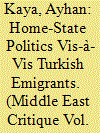|
|
|
Sort Order |
|
|
|
Items / Page
|
|
|
|
|
|
|
| Srl | Item |
| 1 |
ID:
178606


|
|
|
|
|
| Summary/Abstract |
Numerous studies have analyzed Turkey’s Presidency of Religious Affairs (Diyanet) under the Justice and Development Party (AKP) government. This article focuses on the Diyanet’s new role in the politics of the family and argues that this role constitutes the main channel for its institutional expansion. By discussing the female preachers employed to reach more women and the Family Guidance Bureaus established to strengthen the family through religious guidance, the article looks at the ways in which both have expanded Diyanet’s institutional capacity to reshape gender and family relations along state-sanctioned religious lines. It also suggests that desecularization may offer a conceptual framework with which the implications of Diyanet’s expansion through familialist policies can be analyzed.
|
|
|
|
|
|
|
|
|
|
|
|
|
|
|
|
| 2 |
ID:
188176


|
|
|
|
|
| Summary/Abstract |
This article scrutinizes the ways in which Turkish state actors have shaped the social ecosophy of emigrants and their descendants residing in Europe. Describing the Turkish state’s perspectives toward emigrants reveals that Turkish state actors always have instrumentalized emigrants since the beginning of the migratory processes in the 1960s. The focus will be on the current Turkish government’s acts and policies, which are likely to contribute to the Muslimization of Turkey-origin emigrants in diaspora, or in other words, to their labeling simply as ‘Muslims’. Based on a thorough analysis of secondary literature, discourse analyses of contemporary Turkish political leaders’ speeches aimed at Turkish emigrants and their descendants as well as my earlier and ongoing field research findings, I argue that it is the indifference of some European state actors who have not offered political opportunity structures for devout Muslims with Turkish background to be incorporated into the public/political space at the expense of pushing them into the Turkish state actors’ hands that offer alternative political opportunity structures. Hence, the article elaborates the ways in which receiving states’ policies and practices toward migrant-origin people impact diaspora politics of the migrant-sending states. The emphasis is on German and Turkish state actors.
|
|
|
|
|
|
|
|
|
|
|
|
|
|
|
|
| 3 |
ID:
171212


|
|
|
|
|
| Summary/Abstract |
This study examines the relationship between religion and politics in current Turkish society, particularly since the Justice and Development Party (AKP) consolidated its power over state institutions and replaced the Kemalist establishment in the early 2010s. It argues that the AKP has re-instrumentalized the Presidency of Religious Affairs (Diyanet) and used its mosques to enact a performance of nationalism, deviating from a Kemalist, laicist-national identity towards a more encompassing, Ottomanist, religious one. After discussing the unique understanding of laicism in Turkey and the transformation of Diyanet as a state apparatus, content and discourse analyses are used to examine the texts of 1,200 Friday khutbas, weekly prayers that are ordinarily prepared and distributed nationwide by Diyanet. These indicate how citizens perform their nation simply by participating in gatherings, composing the congregation, listening to imams, and being exposed to the reminders of their (re-)identified nationality. The content analysis of Friday khutbas over three distinct periods—1927, 1997–2010, and 2011–2018—illustrates that, as political power shifts over time, the repetition of certain banal reminders used in the khutbas has resulted in different performances of the nation and that, under the rule of the AKP, a new performance has already begun.
|
|
|
|
|
|
|
|
|
|
|
|
|
|
|
|
| 4 |
ID:
097522


|
|
|
|
|
| Publication |
2010.
|
| Summary/Abstract |
The current study aims to examine the Directorate of Religious Affairs (Diyanet) from its formation in 1924 through to the present day, and attempts to place the Diyanet appropriately in the context of the prevailing perplexity over state-religion relations in Turkey. It questions Turkish-style secularism and examines the responsibilities, power, and limits of the Diyanet. The Diyanet has undertaken responsibility for making the state's control over religion visible through sermons and publications, helping the state gain legitimacy among religious people. Meanwhile, it has been the Achilles' heel of the republican regime in the sense that religious people found employment in it and some considered this as a way to influence the laicist state from inside.
|
|
|
|
|
|
|
|
|
|
|
|
|
|
|
|
| 5 |
ID:
187479


|
|
|
|
|
| Summary/Abstract |
The article builds on current academic debates pertaining to the use of religion in global politics. By examining how and why religion is used as a tool for foreign policy aims as well as for perpetuating a state’s identity and institutional capacity at home and abroad; the article presents a theory-informed discussion on Turkey’s transnational politics of religion from a comparative perspective. The country’s use of religion as a political tool outside of its borders has been studied in Western Europe, Africa, Asia and the Balkans thanks to extensive fieldwork and interviews conducted between 2016 and 2020. The article investigates how and why Turkey has implemented similar policies with different aims in different geographic territories and the underlying material and normative motivations for this pursuit. The main argument presented in the article is that Turkey, under the rule of the AKP (Justice and Development Party), employs religion for three fundamental reasons: to bolster its regional and global influence, to access regions or groups that are difficult to reach through traditional foreign policy tools and to alter domestic political balances or amass power.
|
|
|
|
|
|
|
|
|
|
|
|
|
|
|
|
|
|
|
|
|